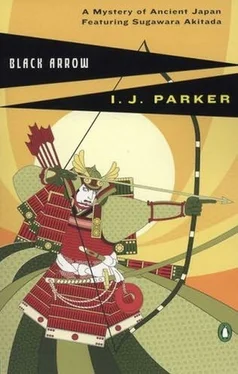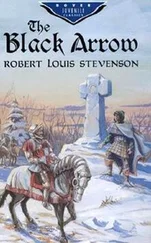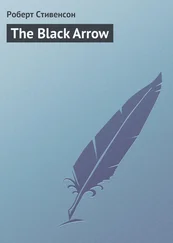I. Parker - Black Arrow
Здесь есть возможность читать онлайн «I. Parker - Black Arrow» весь текст электронной книги совершенно бесплатно (целиком полную версию без сокращений). В некоторых случаях можно слушать аудио, скачать через торрент в формате fb2 и присутствует краткое содержание. Год выпуска: 2006, ISBN: 2006, Издательство: Penguin, Жанр: Исторический детектив, на английском языке. Описание произведения, (предисловие) а так же отзывы посетителей доступны на портале библиотеки ЛибКат.
- Название:Black Arrow
- Автор:
- Издательство:Penguin
- Жанр:
- Год:2006
- ISBN:9780143035619
- Рейтинг книги:5 / 5. Голосов: 1
-
Избранное:Добавить в избранное
- Отзывы:
-
Ваша оценка:
- 100
- 1
- 2
- 3
- 4
- 5
Black Arrow: краткое содержание, описание и аннотация
Предлагаем к чтению аннотацию, описание, краткое содержание или предисловие (зависит от того, что написал сам автор книги «Black Arrow»). Если вы не нашли необходимую информацию о книге — напишите в комментариях, мы постараемся отыскать её.
Black Arrow — читать онлайн бесплатно полную книгу (весь текст) целиком
Ниже представлен текст книги, разбитый по страницам. Система сохранения места последней прочитанной страницы, позволяет с удобством читать онлайн бесплатно книгу «Black Arrow», без необходимости каждый раз заново искать на чём Вы остановились. Поставьте закладку, и сможете в любой момент перейти на страницу, на которой закончили чтение.
Интервал:
Закладка:
“Nothing, Excellency,” said the thin Hamaya, hurrying after him.
In his office, Akitada removed his quilted coat. Hamaya received it respectfully and waited as Akitada sat down at the low desk.
“I don’t understand it,” Akitada muttered, rubbing his chilled hands over the charcoal brazier filled with a few glowing pieces of coal. “The notices have been posted for days. A province of this size must have a tremendous backlog of civil cases. My predecessor not only departed without explaining the empty granary, but he left unfinished business.”
The clerk still stood, clutching Akitada’s clothing. “Under the circumstances, I suppose,” he ventured, “it is a good thing, sir. Only two of the clerks have reported for duty.”
Akitada rubbed his belly morosely. He still suffered from occasional bouts of cramping and had refused breakfast as well as another dose of Seimei’s bitter brew. Now his stomach grumbled also. And he still felt ashamed of his outburst in the courtyard. By losing his temper he was playing into the hands of enemies who apparently manipulated both the tribunal staff and the local people. Since his visit to Takata, Akitada thought he understood the reasons for his difficulties.
Now he looked at his clerk. “Tell me, Hamaya, are you and the other clerks afraid to come to work here?”
Hamaya hesitated, then said, “I believe that the two youngsters outside have great need of their salary because their families are very poor. As for me, I have no family and need not fear anybody”
Akitada clenched his fists. “This is intolerable!” he muttered. He thought for a moment, then said, “Tell my lieutenants to report when they are free. 1 know you and Seimei are still organizing the archives, but have one of your clerks make a search for information about the outcasts and their dealings with the Uesugi family.”
He spent the next hour as he had for the past week, reading reports left by his predecessors. Some of these were woefully sketchy and tended to cover up the fact that the incumbent had been unable to cope with matters. A pattern began to emerge. Of the four types of major reports each governor or his representative had to dispatch to the capital every year, three showed adequate levels of productivity for the province. These were prepared carefully and signed off on by the governor. The fourth report, called the court report, was a different matter. It indicated the condition of the provincial administration, both of its buildings and supplies and of its staff. These reports listed woeful shortages, were poorly written and prepared, and liberally laced with complaints by the incumbents. They pointed to inadequate staffing, insufficient funds, lack of labor, and lack of grain delivery to the provincial granary. The specific details were better than the conditions Akitada had found, but they explained to some extent why governors and their representatives had eventually absented themselves from the provincial capital. The tribunal was “uninhabitable” and the staff “nonexistent,” one recent official had written.
The documents Uesugi had provided to account for rice collection and storage were as neat and careful as the earlier three. They specified what amounts were stored locally and what had been shipped north as provisions for the fighting troops.
The difference between the court report and the others, as Hamaya had explained, was that anything involving the collection of rice and tribute was in the hands of the high constable. The appointed officials had simply approved documents prepared elsewhere.
It was an appalling situation. Akitada was effectively without the authority he needed to govern.
When Tora and Hitomaro reported, he said, “Sit down! The day for registering civil suits is past. I fully expected a stack of depositions by now, yet not even a single case has been filed. Since human beings cannot live together for a whole year without disagreeing, we must assume that the people have been instructed not to file their claims with this court.”
“But why worry?” asked Tora. “It’s less work.”
Hitomaro shot him an impatient look. “Think, Tora. If there’s no work for him, our master will be recalled.”
“Exactly,” said Akitada. “Someone wants to be rid of us, and everything points to the Uesugi.”
Tora thought about it. His face darkened. “What if we don’t leave?”
Hitomaro grunted. “What? Five of us against hundreds of Uesugi warriors and thousands of locals? And the provincial guard are not exactly our friends either.”
The five were, of course, all male and included, besides Akitada and his three lieutenants, the aged Seimei. Akitada said, “I’m glad you understand our position.” Unlike Tora, who was the son of a farmer, Hitomaro belonged to provincial gentry and was therefore better educated and quicker to see political intrigue. “Since, as you remind us, we are without military support, we must find allies as quickly as possible. We need the support of the local people and must try to win their trust. That is why I wish we had court cases. They attract the curious, and we might gain a bit of respect among the townspeople that way.”
Hitomaro scratched his short beard. “There is always the case of the innkeeper’s murder. They brought in the suspects last night. Chobei and his men have been questioning them all night and say they have confessions. You could hear the case instead of Judge Hisamatsu.”
“I have to show cause to do that.” An uncomfortable silence fell. Akitada’s stomach growled noisily.
Tora and Hitomaro exchanged glances. Tora said, “I bet they beat those confessions but of them, sir.”
Akitada shifted in his seat. Constables customarily flogged prisoners to encourage confessions. By law, a confession was necessary for conviction of a crime, but these confessions had come very promptly, and the questioning might have been rather too efficient. He frowned and said unhappily, “I suppose I could take a look at the documents. Tora, go get the transcripts of the interrogation!”
Tora returned with a fistful of loose papers and a grin on his face. “That threw them into a proper tizzy. Didn’t want to turn them over. Said they were for the judge’s eyes only. I had to use a bit of pressure.”
Akitada noted his bruised knuckle but said nothing. Instead he took the papers and sorted through the badly written pages of questions and answers. They did not take long to read. Akitada laid down the last page with a sigh. His lieutenants looked at him expectantly.
“I’m afraid the evidence is solid. There are witnesses who have identified two of the men as belonging to a notorious gang which has been robbing inns up and down the northern road. The one called Takagi had the bloody knife still on him when he was caught. He is from this province.” Akitada paused. “And the other two, Okano and Umehara, have signed confessions.”
Tora and Hitomaro said simultaneously, “But, sir-” and broke off. Tora nodded to Hitomaro. Hitomaro said, “If you will permit, sir, Tora and I’ll have a look at the prisoners.”
“No. I don’t want to give that judge any more reason to complain that I have been interfering in his affairs. Just return the transcripts with my thanks.”
They exchanged glances again. Hitomaro bit his lip. “Tora and I heard screams during the night. It sounded like torture. The prison is part of the tribunal. What goes on there falls under our jurisdiction.”
Akitada thought about the brutish Chobei and his men. “Very well. But make it an inspection rather than an investigation.”
They returned quickly. Hitomaro was grim-faced, and Tora barely suppressed his outrage.
“The inhuman bastards nearly killed them,” he snarled the moment he entered. “There’s no way those poor devils could have done it. I’ll never believe it. You’ve got to investigate, sir. It’s just common decency.”
Читать дальшеИнтервал:
Закладка:
Похожие книги на «Black Arrow»
Представляем Вашему вниманию похожие книги на «Black Arrow» списком для выбора. Мы отобрали схожую по названию и смыслу литературу в надежде предоставить читателям больше вариантов отыскать новые, интересные, ещё непрочитанные произведения.
Обсуждение, отзывы о книге «Black Arrow» и просто собственные мнения читателей. Оставьте ваши комментарии, напишите, что Вы думаете о произведении, его смысле или главных героях. Укажите что конкретно понравилось, а что нет, и почему Вы так считаете.












